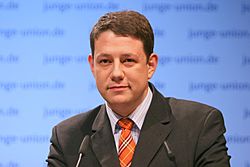Philipp Mißfelder facts for kids
Quick facts for kids
Philipp Mißfelder
|
|
|---|---|
 |
|
| Member of the Bundestag | |
| In office 18 October 2005 – 13 July 2015 |
|
| Personal details | |
| Born | 25 August 1979 Gelsenkirchen, Northrhine-Westphalia, West Germany |
| Died | 13 July 2015 (aged 35) Dülmen, Northrhine-Westphalia, Germany |
| Nationality | |
| Political party | Christian Democratic Union |
| Alma mater | Technical University of Berlin |
| Profession | Historian |
Philipp Mißfelder (born August 25, 1979 – died July 13, 2015) was a German politician. He was a member of the German Parliament. From January to March 2014, he worked for the German government. His job was to help improve relations and cultural exchange between different societies, especially with the United States.
Contents
Philipp Mißfelder's Life
Early Life and Education
Philipp Mißfelder was born in Gelsenkirchen, a city in Northrhine-Westphalia, Germany. After finishing high school in 1999, he served in the German military. In 2000, he started studying law. However, in 2003, he changed his studies to history at the Technische Universität Berlin. He finished his history degree in 2008, even while working as a member of the German Parliament.
Getting Involved in Politics
Mißfelder joined the Junge Union, a youth political group, in 1993. Two years later, in 1995, he became a member of the Christian Democratic Union (CDU) party. From 1998 to 2000, he led the Schüler Union, a group for high school students.
He joined the CDU's main board of directors in 1999. In 2002, he was also voted onto the Junge Union's board. From 2002, he helped lead a group focused on improving connections between younger and older people in the party. In 2008, he became the youngest member of the CDU's top leadership group, called the Präsidium.
Serving in the German Parliament
Philipp Mißfelder became a member of the German Parliament in 2005. He was not directly elected by voters in his local area. Instead, he entered parliament through his party's "Landesliste" system. This system allows some party members to become members of parliament based on their party's overall success.
In the Bundestag, he was an important voice for his party (CDU/CSU) on foreign policy. He was also a member of the parliament's foreign relations committee.
Other Important Roles
Beyond his work in parliament, Mißfelder was involved in several other organizations. Since 2006, he was a member of the Konrad Adenauer Stiftung, a political foundation. He also worked with the Bundestag's group focused on the European Union. He was a deputy member of the Haus der Geschichte Foundation in Bonn, which runs a museum about German history.
He also served on the steering committee for the German-British Society's Königswinter Conference. He was part of the Executive Committee of the German Council on Foreign Relations. In 2013, he joined the board of directors for the Atlantik-Brücke e.V., a group that promotes ties between Germany and North America.
Philipp Mißfelder was married in 2006 and had two daughters. He was a Roman Catholic.
His Passing and Memorial
Philipp Mißfelder died suddenly on July 13, 2015, due to a pulmonary embolism, which is a serious blood clot in the lung. Many politicians expressed their sadness. Volker Kauder, the chairman of his parliamentary group, said that the group lost a key foreign policy expert. He also said he lost a good friend.
To honor his memory, a forest in the Negev desert in Israel was named the Philipp-Mißfelder Forest.
Philipp Mißfelder's Political Views
Views Within His Party
Within the Christian Democratic Union (CDU), Mißfelder was known for starting discussions about the party's traditional conservative values. In 2007, he helped create the CDU's "Einstein Connection." This internal group aimed to strengthen conservative ideas within the party.
He also strongly supported Karl-Theodor zu Guttenberg, a German defense minister. Guttenberg had to resign after a scandal. Mißfelder called the criticism against Guttenberg from within their own party "offensive."
Views on German Issues
Mißfelder was known for having strong opinions on social and money-related issues in Germany. In 2003, he made headlines when he questioned whether social welfare should pay for hip replacements for 85-year-olds. This statement led to a big discussion about Germany's social welfare system. In 2009, he caused another debate by suggesting that a social welfare increase might mostly benefit the cigarette and alcohol industries.
He believed that the German retirement age, which was 67, should be raised to 70. He also argued that changes to healthcare funding were putting too much pressure on younger generations. He voted against the 2008 healthcare funding reform in parliament. He said it was not fair to all generations.
He took a firm stance against protestors at the G8 summit in Germany. He compared them to a former German terrorist group.
Views on World Issues
Mißfelder was an important voice on Germany's foreign affairs. He spoke against Turkey possibly joining the European Union. However, he supported the United Nations' actions in Libya, even though many in Germany disagreed.
He strongly criticized the famous German author Günter Grass. Grass had written a poem that was seen by many as critical of Israel.
When it was revealed that the US government could intercept messages from smartphones, Mißfelder said it was a matter for the US government, the NSA, and phone makers to deal with, not politicians.
In March 2013, Mißfelder praised former German chancellor Gerhard Schröder for speaking out against the War in Iraq. In May 2014, he made news for being one of the few German politicians to attend Schröder's birthday party in St. Petersburg, Russia. At the party, he spoke with Vladimir Putin. This happened during a time of high tension due to the Russo-Ukrainian War. He had not told Chancellor Angela Merkel or his party leader about his visit.
 | Selma Burke |
 | Pauline Powell Burns |
 | Frederick J. Brown |
 | Robert Blackburn |

